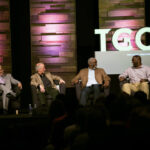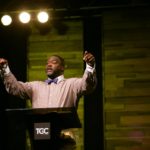Expository apologetics—the practice of answering objections with the power of God’s Word—is for everyone.
First, it’s for the unbeliever. This is the person both ignorant of and antagonistic toward the gospel. This audience requires an evangelist.
Second, it’s for the churchgoer. This is the person, whether converted or unconverted, sitting under the regular preaching and teaching of the Word. This audience requires a preacher/ teacher.
Third, it’s for the disciple. This person is brand new to the things of God. This is the child being raised in the discipline and instruction of the Lord (Eph. 6:4), or the new convert unlearning and relearning everything he thinks he knows. This audience requires a discipler.
1. The Evangelist as Expository Apologist

The evangelist is confident, energetic, engaging, and active in bringing the gospel to bear in conversations with non-Christians. For him, expository apologetics is an invaluable tool. He must be equipped and prepared to confront ideas that stand opposed to the Christian world-and-life view.
Whether we’re evangelists, preachers/teachers, or disciples, our goal is the same. As expository apologists, we point people to Christ and call them to repent and believe. We’re constantly showing people how foolish and dangerous it is to trust in anything but him. At bottom, the expository apologist is an evangelist.
Evangelism is more than merely convincing people of the rightness of Christianity or getting them to walk an aisle and pray a prayer. Evangelism is about making disciples—calling people away from the kingdom of man and into the kingdom of God. This transfer of allegiance is at the heart of expository apologetics.
For the evangelist, the most important aspects of expository apologetics are knowing (1) why unbelief exists and (2) how to turn any conversation into an expository apologetic opportunity. Ironically, while the evangelist is the most obvious candidate for expository apologetics, he’s not the one most likely to use it on a consistent basis.
2. The Preacher/Teacher as Expository Apologist
For years people have commented on the uniqueness of my preaching. Most simply offer kind words of thanks. Others, though, have put their finger on what they see as distinct. One man put it best: “It’s as though you see the text as an outsider.”
What he was trying to say is I have a tendency not to assume things. I often argue with myself during a sermon, taking on the persona of one who disagrees with what I’m saying and then answering the objection. I think psychologists have a name for that and psychiatrists have a drug for it. I’ve managed to avoid treatment long enough to figure out what I’ve been doing all these years and to give it the name “expository apologetics.”
I want to encourage other teachers to look at a text and ask, “What questions does this text raise? What doctrine am I expounding, and what objections are common? What would a person hostile to the gospel be thinking if he or she heard me say this?” These are just a few of the questions that can turn any sermon or lesson into an exercise in expository apologetics.
Now, this isn’t to say everything we do should be geared toward the unbeliever. In fact, I’m not talking about the unbeliever at all here. Unlike the evangelist, the pastor/teacher is, for the most part, dealing with Christians. But Christians have areas of unbelief and doubt too. They live in a world constantly challenging their thinking. They watch TV, go to school, read magazines and newspapers, surf the internet, and interact daily with people and things that influence their thinking. They must be reminded repeatedly, then, of the apostle’s admonition: “Do not be conformed to this world, but be transformed by the renewing of your mind” (Rom. 12:1).
Doing this requires constant vigilance. The pastor/teacher must always be ready to “give instruction in sound doctrine and also to rebuke those who contradict it” (Titus 1:9). And he must be on guard, for “the time is coming when people will not endure sound teaching, but having itching ears they will accumulate for themselves teachers to suit their own passions, and will turn away from listening to the truth and wander off into myths” (2 Tim. 4:3–4).
Expository apologetics is a bulwark against the tendency to forget how hard it is to believe in the face of constant opposition.
3. The Discipler as Expository Apologist
Interestingly, the one least likely to be considered an apologist is the one most likely to engage in expository apologetics. Neither the evangelist nor the pastor/teacher will have a fraction of the expository apologetic encounters the discipler will. The discipler is a parent raising children or a more mature believer taking a new believer by the hand and introducing him or her to the fundamentals of the faith.
Think about it: apologetics is about knowing what we believe and why we believe it, and being able to communicate that in a clear, cogent, winsome manner. It’s all about answering questions posed by skeptics. What are our children? Some of them don’t believe. They’re ignorant. They’re curious. They ask questions—lots and lots of questions. And we need to be ready to answer their questions. Hence, expository apologetics!
As parents we have a tremendous opportunity to shape the faith of our kids. We can either do that well or we can do it poorly, but we will do it. For the discipler, expository apologetics is a means of obedience: “Fathers, do not provoke your children to anger, but bring them up in the discipline and instruction of the Lord” (Eph. 6:4).
Our responsibility as parents is to teach our children those things most surely believed among us. And we should do so with a view toward equipping them to always be “prepared to make a defense to anyone who asks for a reason for the hope that is in them” (1 Pet. 3:15). This is the goal of expository apologetics.
But what about disciplers working with people who aren’t their children, whether new converts or those not quite converted? The answer is simple: treat them like children. In other words, adult new believers need their questions answered too. And they need systematic roadmaps laid out before them. This is the same thing we do as we disciple our own kids.
No matter the circumstance, there’s always a need to make the claims of the gospel both clear and memorable. As we lead people, let’s never forget they we’re helping them to always “make a defense.”
Editors’ note: This excerpt is adapted from Voddie Baucham’s book Expository Apologetics: Answering Objections with the Power of the Word (Crossway, 2015) [review]. You can hear an interview with Baucham below. Please excuse the poor audio quality of the interview, which we hope will be balanced by its worthwhile content.
Is there enough evidence for us to believe the Gospels?
 In an age of faith deconstruction and skepticism about the Bible’s authority, it’s common to hear claims that the Gospels are unreliable propaganda. And if the Gospels are shown to be historically unreliable, the whole foundation of Christianity begins to crumble.
In an age of faith deconstruction and skepticism about the Bible’s authority, it’s common to hear claims that the Gospels are unreliable propaganda. And if the Gospels are shown to be historically unreliable, the whole foundation of Christianity begins to crumble.



































